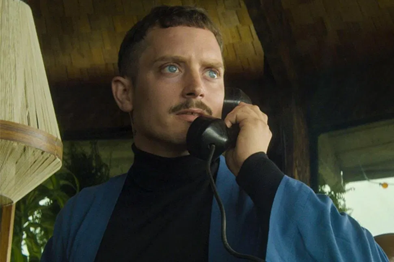If COME TO DADDY works, it works because of its marketing. There are plenty of things to focus on in the Ant Timpson, he of TURBOKID and THE GREASY STRANGLER, comedy-thriller that’s equal parts self-aware, surreal, and scary, but perhaps first and foremost on that list is Elijah Wood’s hair choices. Playing a character who seems to be at least 10-to-15 years Wood’s actual junior (he’s 39 in real life), the ageless purveyor of oddity cinema plays a privileged DJ living in Los Angeles with his mother who is hoping to reconnect with his absent father. The grimy mustache, the tight bowl cut, it all appropriately reeks of LA rave culture, down to the all-black chic fashion choices. Seeing the character played in contrast to his father, Stephen McHattie, is a source of comedy in even the film’s tensest moments.
It’s appropriate to discuss the hair selection at the top, because that’s in many ways what Timpson and Wood would want you to do, a bait-and-switch in a movie filled with bait-and-switches. The first third of COME TO DADDY is a deliberately paced two-hander that wastes no time marinating in the adversarial nature of the two characters. In perhaps the film’s best scene, Wood’s Norval and McHattie’s Gordon sit by a fire, Gordon drunk and pushing back against Norval’s claims of fame and fortune in Beverly Hills. The conversation reaches an apex when Norval states he knows Elton John, to which Gordon, who claims to also know the famous singer, threatens to call him to confirm. It’s a gripping fever dream sequence that works all the better because we know the nature of their relationship will turn violent very quickly.

This after his cell phone, one of 20 custom gold iPhones designed by Lorde, is destroyed. Long live the landline.
But here’s a rare thing to write: COME TO DADDY is probably about an hour too short. While the feverishly paced but slapdash character development of the first third works in a 90-minute movie that’s constantly on the precipice of devolving into a hide-and-seek slasher film, without spoiling anything, that’s not what COME TO DADDY ultimately is. The remaining hour of the film is one with plenty of deliberate twists and turns, ones that the marketing conveniently (and smartly) leaves out, and yet those twists and turns are constantly brushed past in service of reaching an ending. The larger mythology of the film demands a context that Timpson never delivers beyond brief one-liners and awkward exposition, which is a shame, because the film’s main twist, especially as it’s happening, is kind of jaw-droppingly interesting. The film that comes after it, the roughly 40 minutes of gore and violence the poster and trailer promised us, almost live in the shadow of how interesting the third act turn is and how much more compelling a movie COME TO DADDY could have been.
Even if I ultimately wish COME TO DADDY was a movie it’s not, with an abrupt ending that leaves dozens more questions than the filmmakers are interested in exploring, it’s still fairly entertaining. Wood is having a ball as a meek, awkward LA type, the kind he no doubt runs into frequently when he’s actually DJing in Austin or LA. While I wish there was more backstory to most of the film, I can’t say I wasn’t constantly anticipating it’s next reveal; even if it’s messy, COME TO DADDY is at the very least an entertaining mess.















Comments